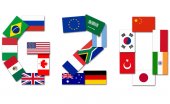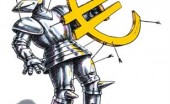Re Ian Bremmer 'Could third-party candidates upend the 2024 US election?' 3 April The current political movement in the USA…
Europe and the EU
Written by Diana Thebaud Nicholson // June 8, 2009 // Britain/U.K., Europe & EU, Government & Governance // Comments Off on Europe and the EU
The European elections saw a record low turnout of 43%. The centre-left did badly in most countries. The centre-right European People’s Party (EPP) will remain the biggest group in the European Parliament. Far-right and Eurosceptic parties did well in Britain, the Netherlands, Hungary and several other countries. See article
11 June
(Linex Legal) The European Commission has announced today its proposed new regulatory framework for the banking and financial services industry. The proposals follow the earlier paper by a high level working group led by Jacques de Larosière …
10 June
EU argues over banking watchdogs
( BBC News) EU ministers have agreed on a framework for improving financial supervision but the 27 member states remain split over what powers new regulators should have.The proposals are based on a report presented in February by a high-level panel headed by Jacques de Larosière, a former IMF managing director.
8 June
Center-right to far-right parties make gains in European Parliament elections
Elections to the European Parliament saw considerable gains for right-of-center parties across Europe, with extreme-right and anti-immigration parties picking up seats in the Netherlands, Austria, Denmark, Slovakia and Hungary. Ruling parties — such as the U.K.’s Labor Party, Germany’s Social Democrats and France’s Socialist Party — were handed historic defeats in a record-low turnout. The European Parliament’s powers are set to expand under reforms in the Lisbon Treaty, which has yet to be approved by all member states. BBC (6/7) , The Independent (London)/Reuters (6/8)
Europe lurches right
(FP) It was a big night for European Conservatives, who (WaPost) picked up European Parliament seats in Germany, France, Italy, Belgium, Britain, and Spain in continent-wide elections marked by record-low turnout. European Commission President blamed governments for voter apathy about the EU, saying, “National politicians, whose debates all too often remain largely national in their focus, must acknowledge themselves more consistently as both national and European actors.”
One national leader who is celebrating is French President Nicolas Sarkozy who became the first French president to lead his party to European victory since 1979, with the opposition socialists barely beating out the third-place green party. Sarkozy will meet this week with German Chancellor Angela Merkel, another winner, ” to open up new projects” for the Union.
Across the English Channel, the mood is not so bright. After the Labor Party’s worst electoral result since 1910, rebel Labor lawmakers will meet today to decide whether to mount a campaign to remove Prime Minister Gordon Brown. The British political establishment has also been shaken up by the strong showing of the widely reviled, anti-immigrant British National Party, which won its first ever seat in the European Parliament.
4 June
The unloved European Parliament – From Strasbourg with indifference
(The Economist) THE rich world’s biggest election, with 375m potential voters, ought to be both exciting and uplifting. Yet campaigning ahead of this weekend’s election to the European Parliament has been neither. Almost everywhere it has focused exclusively on national issues, not European ones. In several countries a ragbag of extremists, nutcases and xenophobes look set to win seats. And the turnout, which has fallen in every European election since 1979, may yet sink to a new low. The fact is that Europe’s electors do not care about their parliament. Most do not bother to vote. Those who do take the excuse to cock a snook at their national governments and boost fringe parties.
8 May
Russia and the West fume and fudge over the countries in between
CAN Europe pull off America’s trick? The European Union wants to bolster stability and prosperity in ex-Soviet countries on its borders, while improving ties with Russia on other matters. That is pretty much what Barack Obama’s new administration has managed. It has separated the issues where agreement is reachable, such as arms control, from those where it isn’t, such as the future of countries such as Georgia. The EU’s efforts, however, look quite puny. At a two-day summit in Prague ending on Friday May 8th it launched an “Eastern Partnership” which is supposed to create closer political and economic ties with six countries: Armenia, Azerbaijan, Belarus, Georgia, Moldova and Ukraine.
13 March
The de Larosière report: two down, two to go
(FT) The recent de Larosière report on financial supervision and stability in the European Union should be praised for its rigorous assessment of the shortcomings of the current, mainly national-based regulatory system. It also makes some recommendations to resolve these shortcomings.
6 March
EU enlargement
After years of negotiations and not a moment too soon, ten new countries joined the European Union in May 2004—Poland, Hungary, the Czech Republic, Slovenia, Slovakia, Malta, Cyprus, Estonia, Latvia and Lithuania—followed by Bulgaria and Romania in 2007. The union’s most contentious expansion would take in Turkey. But long-awaited membership talks, which began in 2005, have run aground over political differences. Further expansions have been rendered unlikely in the near term by the defeat of the EU constitution and by the fissure that the global downturn has opened up between east and west Europe.
Enlargement raises lots of thorny issues for existing members such as migration, agriculture, how soon new members should join the euro, control over labour markets—and, of course, the cost of enlargement. The new members, for their part, are concerned about maintaining their autonomy within the Union.
25 February
(Reuters) FACTBOX-De Larosiere report on EU financial market supervision


